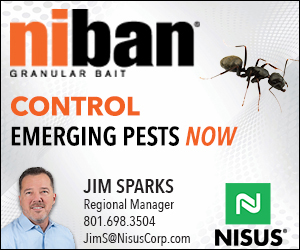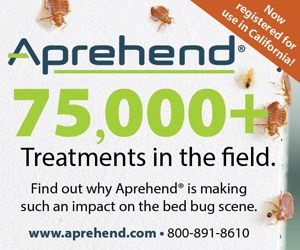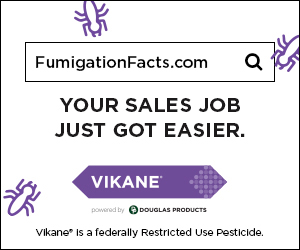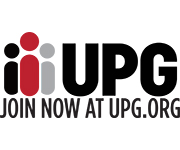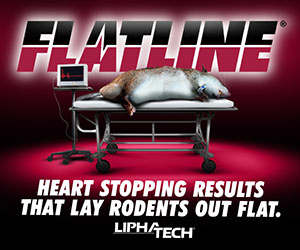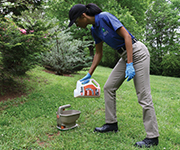 |
||||||||||||||||||||||||
|
October 2021
|
||||||||||||||||||||||||
|
Chief Executive Officer's Notes
Our next BOD Meeting will be in one of our favorite spots, Palm Springs, December 9 & 10. Meeting information will be sent out shortly so watch for that in your email! We wanted to let you know that the City of Palm Springs does have stricter COVID measures than we saw in Carlsbad. You will be required to wear a mask in the hotel and for meetings. The restaurant and bar in the hotel will require proof of vaccination or negative test to sit inside. There is an outdoor seating option for those that do not have a negative test or vaccinations. The City of Palm Springs requires proof of vaccination or negative test to go into restaurants and bars.
Chris Reardon Upcoming Events
West Coast Rodent Academy - VirtualWednesday-Thursday, October 27-28, 2021 Hosted by: The Pest Control Operators of California and UC Cooperative Extension Brought to you in cooperation with Target Specialty Products and Veseris. Register early to join us for this unique urban rodent management virtual workshop which includes lectures to help you better understand rodent ecology and integrated pest management (IPM). Learn about rodent disease, monitoring, trapping, urban rodent surveys and much more. Click here to register: https://ucanr.edu/sites/WCRA/ PWIPM Webinar Series: “Nourishing Greatness”December 7, 2021, from 12:00-1:00 pm PST Please join your fellow industry professionals for our first installment in the “Nourishing Greatness” Webinar Series. This bi-monthly lunchtime series hosted by the California chapter of PWIPM is geared to help strengthen and support our workforce. Dalton will share strategies on how to navigate difficult conversations to make them easier or at least be better at controlling our own reactions during them. Five lucky attendees will win an autographed book! Cost: $10/PCOC Member – $20/Non-Member All proceeds are donations to the California PWIPM “Women of Excellence Scholarship Fund.” Sponsored by: BASF, Bell Labs, and Target Specialty Products Click here to Register (PCOC Discount code is PCOCmember21) December Board of Directors Meeting — IN PERSONOur meeting will be held at the Hilton Palm Springs December 9-10, 2021. We will have our Golf Tournament on Thursday, December 9, 2021. Click here for the Golf Registration Committee Meetings (8:00 am - 12:00 pm) and our BOD Meeting (1:00 pm - 4:00 pm) will take place on Friday, December 10, 2021 and will conclude with our reception at 5:30 pm. We will have similar vendor opportunities as the September BOD. Click here for our Vendor Sign up sheet. Looking Forward...
(un)Leashed Leadership Program - STARTING January 2022!! Sign up today! Click here for Progam information the registration form. PestEd Series
Termite Academy Dates TBD March 7-9, 2022 2022 Expo 2022 June 8-10, 2022
CAPMA Monthly Insurance/Safety Tip
Mental Health Recognized as Significant Workplace Issue
70% of employers report mental health challenges among their employees, 52% report substance misuse or addiction, and 72% say mental health stigma blocks care. These are some of the findings in new research provided by The Hartford, a workers compensation insurance company. While the national study showed employers have strived to support workforce well-being and foster a more compassionate workplace, employers and workers are divided in key areas about mental health in the workplace:
These divergent perceptions indicate the pervasiveness and power of stigma, as well as the continued need for education and communication about mental illness and addiction. Stigma’s Economic CostThe research also showed the economic impact of untreated conditions due to stigma. One-third of U.S. employers (31%) said the strain on employee mental health is having a severe or significant financial impact on their company, a 10-point increase from the March 2020 survey. The Hartford’s claims data demonstrates that untreated mental health and substance use disorders can lead to unplanned absences and prolonged disability. Mental health conditions are among the top five reasons for U.S. workers to file a short-term disability claim, according to The Hartford’s disability claims data (excluding pregnancy). A person diagnosed with a primary injury or illness, along with the presence of mental health conditions, such as anxiety or depression, takes two to three times longer to recover than someone with similar injuries or illness without those conditions. “The recent research from The Hartford is encouraging and shows U.S. employers are concerned for their employees’ mental health,” said Daniel H. Gillison Jr., CEO of the National Alliance on Mental Illness (NAMI). “We are acutely aware that the need for mental health services is only increasing and reducing stigma in the workplace is paramount to improving the lives of employees. Mental health support in the workplace is a win-win for both workers and businesses.” How to Be Stigma-FreeTo help foster an open and inclusive work culture, The Hartford and NAMI recommend employers and workers:
Employers can also:
“We are encouraged our survey showed a majority of employers and employees think mental health will become less stigmatized in the workplace as a result of the pandemic,” said Christopher Swift, Chairman and CEO of The Hartford. “Mental health matters now more than ever. Together with NAMI, we remain committed to eradicating stigma that threatens human achievement so that more people can prevail.” For more information and help, contact the Insurance professionals of the PCOC Insurance Program. Call us at: 877.860.7378.The ProPest Insurance Authority: "Focused on You." Paul Lindsay
What Are the Pros and Cons of PPC Advertising?Is PPC advertising suitable for your pest control services? To answer that question, let’s weigh the pros and cons. ProsPest control companies focus on a local service area. After all, people look within their city or township for a professional exterminator. That being the case, there are some strong advantages to PPC for building your clientele… Cost-effectivenessIf done well, PPC is very cost-effective. You only pay when a visitor comes to your page. Plus, you get to decide exactly how much you're willing to spend. That makes it easy to determine (and stick to) a marketing budget. CustomizationYou can adjust your pest control campaign and keywords along the way, constantly optimizing them for better performance. If a campaign isn’t working the way you expect it to, you can course-correct on the spot. TargetingYou can target your audience of homeowners and commercial businesses based on things like language, geographical location, and even device type. That makes it really easy to go after the job type or price point you want to go after—whether they are located in a large metropolitan area or in a specific neighborhood. SpeedPPC ad campaigns yield almost immediate results, making them much faster than organic campaigns. ConsAs strong as the advantages are, PPC ads aren’t for every pest control company. There are a couple of cons you should be mindful of. Technical skillsPPC is more technical than other forms of advertising. While this guide is enough to get you headed in the right direction, it’s hardly everything you’ll need to know to run successful PPC campaigns. If you want to get the most out of PPC ads for your services, you’ll need to do one of two things:
“If you want your PPC campaigns to remain effective, you have no choice but to evolve. In some cases, that evolution will mean thinking about things very differently than before.” – Search Engine Journal Cost accumulationIf you don't manage and optimize your campaigns constantly, their costs can increase while the conversion rate drops. You could end up paying a lot for not much in return. In other words, PPC is not a “set it and forget it” strategy. You (or your PPC partner) will need to monitor results and adjustment as needed. How to Set Up PPC for Your Pest Control BusinessWhether you choose to work with a pro or tackle PPC campaigns on your own, it’s helpful to have an overview of the setup process. This is a high-level summary of what it takes to actually set up PPC ads. 1. Research the CompetitionBefore you design your campaign, you’ll want to do some quick competitive research. If you know what your competitors are doing, that will give you an idea of what currently works. For example, you’ll learn about keywords you may want to target, Google searches that include PPC ads for other pest control services, and what kind of landing pages those PPC ads are pointing to. Pay special attention to their ad text and their landing pages. 2. Find the Right KeywordsKeywords are the heart and soul of a PPC campaign. Use tools like Google Keyword Planner to find out average click-through rates (CTRs), cost-per-click (CPC), and search volume for various keywords. Google Keyword Planner will even show you a difficulty score for each keyword. That will tell you how hard it is to get your ad to show up in organic search results. 3. Focus on a Specific Location and ServiceTo attract local projects, you’ll need to include your location and specific services in your ads. Why? Because a shocking number of people use basic, location-based searches when looking for service providers on Google. Terms like “pest control companies near me” or “bed bug treatment in Los Angeles, CA.” The better you know your ideal audience, the more specific you can get with location and services. 4. Build Your Ad AccountYou’ll need to define your ad campaigns by adding keyword groups. Each campaign will have a total budget, and each ad group will have a list of keywords. You’ll need ad copy for each ad group. This copy is what will get property owners to click through, so it’s important. Keep the following in mind:
5. Start Your CampaignOnce you have everything in place, all that’s left to do is actually launch your PPC campaign. Next StepsPPC is complex. That’s as true for pest control businesses as it is for any other home services industry. A PPC expert can help you create and run your campaign. They’ll research keywords relevant in the pest control world, set up your ad accounts, track your ads, and optimize your content for high conversions. When you work with a specialist who has handled PPC for pest control companies, you will be drawing from a wealth of knowledge on how to market your expertise successfully. Contact us today for more information about how Market Hardware helps pest control companies launch high-converting PPC ads that pull in more jobs! Market Hardware is happy to offer Web Marketing consultations — give us a call to learn more! Contact us today if you’re interested and want more information! You can email PCOC@markethardware.com or call (888) 381-6925. Frequently Requested Information
Frequently Asked For Websites
One Thing in Web Marketing
The Quick Start PPC Guide for Pest Control CompaniesIn this article, we’ll walk you through the basics of what to know before you attempt PPC advertising for your pest control services. Whether you plan to take the self-taught approach or hire a digital marketing professional, this information is critical for you to know. What is PPC?PPC stands for Pay-Per-Click. As the marketer, you only pay for the ad when someone clicks on it. Hence the name. You likely see PPC ads on a daily basis, even if you aren’t familiar with this type of marketing. Frequently, PPC ads appear right at the top of Google search results, giving them prime placement. PPC ads are a good option for contractors to take advantage of because you can target your specific audience—both by location and the type of pest control service they’re seeking. However, you’ll only pay for your ads if/when someone actually clicks on them. “PPC can pay off if you have the budget. It’s a guaranteed way of getting your ad the best placement …” — Forbes Keyword The keyword for your ad should be a specific word or phrase related to the pest control service you’re promoting. Examples include: “pest extermination”, “rodent removal” or “safe pest control”. You’ll want to identify several of these phrases depending on the types of pest control services you offer, use them as a set, and determine the maximum amount you’re willing to pay per click. Finding the right keywords for a PPC campaign is a bit of an art. For that reason, many pest control businesses seek out marketing services who are familiar and experienced within the pest control industry. The goal is to maximize performance while minimizing cost. Landing PageEvery PPC ad links to something. That “something” is almost always a landing page on the advertiser’s website. While you could use your homepage (or any other existing page) for your PPC ad, we recommend against it. PPC ads perform best when the associated landing page includes copy that closely aligns with the message of the ad. Your best bet is a custom landing page for each separate PPC ad you run. SERPSERP stands for “search engine results page.” It’s the list of results you see when you do a Google Search. Google’s algorithm will analyze searches and determine if your ad is relevant. Relevance is based both on your keyword and on the content of the landing page your ad points to. This is important. Strong keywords and well-crafted ads aren’t enough. You need relevant, compelling landing pages. If Google determines that your ads and the linked landing page are a good match for the pest services search an online user is looking for and you’ve bid enough on the related keywords, your ad will display with organic search results. Ad CampaignYour selected keywords, text ads, URLs, and landing pages are all included here. The better the overall package, the higher the quality score Google will associate with your pest control ad.
|
||||||||||||||||||||||||


